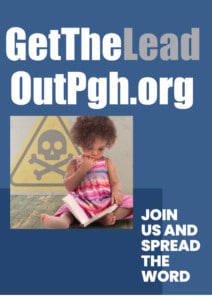There is no safe amount of lead exposure. Lead poisoning can lead to many health impacts including brain and nervous system damage, slowed growth and development, learning and behavior problems, hearing and speech problems and an increased risk for kidney disease, hypertension, heart disease, anemia, miscarriage, osteoporosis, stillbirths and infertility in both men and women.
It is important to recognize the sources of lead including paint/dust (in homes built before 1978), water, soil, consumer products such as glazed pottery, toys and some spices. Certain hobbies including hunting and fishing and some occupational exposures including the automotive industry, can put people at risk for lead exposure.
Join the Get The Lead Out PGH campaign and request a community program.


Allegheny County Safe and Healthy Homes
- Allegheny Lead Safe Homes Program: FREE lead paint testing and home repairs for families who fulfill specific requirements. Homeowners, tenants and landlords can all apply. Landlord and tenant must both agree to program guidelines.
- Eligibility requirements include property location and age, homeowner or renter in Allegheny County, presence of a child younger than 6, presence of a lead hazard, and income level. Email or contact 412-227-5700 to apply.
- Allegheny County Health Department Home Lead Investigations: If your child’s confirmed blood lead level is at or above 5 ug/dl, ACHD’s Housing and Community Environment Program will contact your family and offer a free voluntary lead-based paint investigation to identify potential sources of lead exposure in your home. Contact the Housing program at 412-350-4046 to learn more.

Downloadable Resources
WHE has created shareable guides related to lead, indoor air quality, consumer products, and other environmental health topics.

Subscribe
WHE sends a monthly newsletter with the latest news on the region’s environment and public health.